This article was co-authored by Claire Donovan-Blackwood. Claire Donovan-Blackwood is an Arts & Crafts Specialist and CEO of Heart Handmade UK, a site dedicated to helping people live a happy, creative life. With over 13 years of experience, Claire uses art as a form of therapy and focuses on mindfulness in the making of art. She makes crafting easy and accessible for those she works with. Claire received her B.A. in Photography & Visual Imagery from The University of Huddersfield.
This article has been viewed 96,587 times.
Making your own ink is a lot of fun. Plus, natural ink made from tea and other simple ingredients can be more environmentally-safe than other ink products you may buy. Using black tea, water, gum Arabic or cornstarch, and an optional splash of vinegar, you can create a high-quality homemade ink in very little time.
Steps
Making Tea
-
1Gather materials. For this process, you are going to need black tea, water, and a thickening agent (either gum arabic or cornstarch). Some recipes also call for vinegar, which can make your ink a bit more uniform in color. You will also need a few measuring spoons, a metal or wooden spoon, a strainer (if using loose tea), and a ceramic bowl. Finally, if you intend to bottle your ink, you’ll need a small glass bottle with a screw-top lid.
- Gum Arabic can be found at most craft stores.
- Everything else may be found at a grocery store.
EXPERT TIPClaire Donovan-Blackwood is an Arts & Crafts Specialist and CEO of Heart Handmade UK, a site dedicated to helping people live a happy, creative life. With over 13 years of experience, Claire uses art as a form of therapy and focuses on mindfulness in the making of art. She makes crafting easy and accessible for those she works with. Claire received her B.A. in Photography & Visual Imagery from The University of Huddersfield.Arts & Crafts Specialist
 Claire Donovan-Blackwood
Claire Donovan-Blackwood
Arts & Crafts SpecialistUse teas that have a dark color and bitter taste. Claire Donovan-Blackwood, the owner of Heart Handmade UK, says: “Teas that are dark and bitter have high levels of the chemical tannin, which is used in the process of tanning leather. Teas with high levels of tannin, like black and green tea, will work best for making ink.
-
2Measure your tea. If your black tea is in mesh tea bags, you are going to use 4 of them. If you are using loose-leaf tea, you will need about 2 tbsp. Place the measured tea into a large ceramic bowl.[1]Advertisement
-
3Boil water. For this recipe, you will need ½ to ¾ cups of boiling water. Place your water on the stove, or use an electric kettle to heat your water to boiling. It is a good idea to measure your water before heating it up, that way you reduce the risk of scalding yourself.
-
4Add boiling water to tea leaves. Take your boiling water (which has already been measured) and pour it carefully over your tea bags or tea leaves in the ceramic bowl.
-
5Stir. Using your wooden or metal spoon, swirl the boiling water with the tea leaves. This helps to evenly distribute the water and tea to create an even ink tone.
-
6Allow it to steep briefly. As this is only a preliminary “steep” before adding thickening agents (or other ingredients), you only need to allow 3-4 minutes of steeping. You want the tea to darken a bit, but you need the water to still be hot when you add the next ingredient. You may want to keep your water on low heat during this step.[2]
Adding Additional Ingredients
-
1Select the recipe you’d like to use. In order for your tea to be transformed into usable ink, you need to thicken the liquid. There are two schools of thought when it comes to thickening agents. Gum arabic is the more popular choice for ink recipes, although it may be harder for you to find. Another option is cornstarch, which may be slightly less effective, but you may have it in your cupboard at home.[3]
-
2Add gum arabic. If you have elected to use gum arabic, using your measuring spoon, measure out 1 tsp. of gum arabic. Add this to your hot water and stir to combine.[4]
-
3Add cornstarch. If you have chosen to use cornstarch instead of gum arabic, there is no specific measurement to follow. Begin by adding 2 tsp. of cornstarch to your hot tea and stirring vigorously. Continue to add 1 tsp. at a time until the ink reaches a nice, thick consistency.[5]
-
4Add vinegar. The addition of 1 tbsp. of white vinegar to your recipe works to fix the ink and create a stable, uniform color. If you have vinegar at home, consider adding this optional ingredient. Simply measure out 1 tbsp. of white vinegar, and add this to your tea, after the addition of a thickening agent. Stir well.[6]
-
5Add thyme essential oil. Another optional addition is that of thyme essential oil. Thyme essential oil prevents the growth of mold in your ink. If you intend to bottle your ink and to save it for a while, this may be an important addition. Essential oils can be found at most health food stores. (They tend to be a bit pricey, but will last you for a very long time).[7]
-
6Let it steep again. Allow your concoction to steep for 15-20 minutes. Leaving it to simmer on very low heat may result in a deeper hue. Set a timer and watch your tea darken and transform.[8]
Finishing Your Ink
-
1Release tannins. Using either the back of a spoon or your tea strainer, squeeze down the tea bags or tea leaves, removing all of the water. This works to release more tannins into the water, creating a richer ink.
-
2Remove tea. Strain the hot water into another bowl (or down the sink), in order to remove the tea leaves and/or tea bags. If using loose-leaf tea, you may want to repeat this step to ensure that all particles have been removed from your ink.
-
3Allow the ink to cool completely. Your ink is nearly done; however, you will need to allow it to cool down completely before it will be ready to use. This cooling down time allows the color to set. Cool ink will also have a more dramatic effect on paper.[9]
-
4Test out the ink. Using a steel nib pen, dip pen, or quill pen, simply place the tip into your ink and begin writing. If you do not have a pen like this, you can make one by making a diagonal slice in the bottom of a plastic straw.
- Fountain pens should not be used, as this ink can damage them.
-
5Bottle the ink. Once cooled, your ink can be bottled. Using a small funnel, pour your ink into your small glass bottle. (If you do not have a funnel, you can make one out of thick paper.) Close the lid tightly and store your ink in a cool, dry place.[10]
Community Q&A
-
QuestionHow do I make the quill?
 Community AnswerYou can make a quill by buying a large feather in a craft store and making a diagonal slice in it. A cheaper option is to use a plastic straw instead.
Community AnswerYou can make a quill by buying a large feather in a craft store and making a diagonal slice in it. A cheaper option is to use a plastic straw instead. -
QuestionHow do I make the ink black?
 Community AnswerYou can use another method, like walnut ink, if you would like darker ink.
Community AnswerYou can use another method, like walnut ink, if you would like darker ink. -
QuestionWhat should I do when my ink turns to jelly while simmering it?
 Community AnswerTurn the heat up. This could help prevent the clumping and gentrification of the liquid.
Community AnswerTurn the heat up. This could help prevent the clumping and gentrification of the liquid.
Warnings
- Even small particles in homemade inks can clog up fine fountain pens. Instead of a good fountain pen, use homemade inks only with a dip pen or quill pen instead.⧼thumbs_response⧽
- Inks made from plant sources like tea and berries are not acid-free and should not be used for archival purposes.⧼thumbs_response⧽
Things You'll Need
- Tea bags or loose tea leaves
- 1 ceramic or glass bowl, large
- Gum Arabic or cornstarch
- White vinegar (optional)
- Spoon (wooden or metal)
- Strainer (sieve, colander, or cheesecloth)
- Measuring spoons
- Dip pen or plastic straw
- Glass bottle, small with a lid
References
- ↑ http://www.slideshare.net/Geberlyn/ink-made-from-teabags
- ↑ http://www.slideshare.net/Geberlyn/ink-made-from-teabags
- ↑ http://www.brighthubeducation.com/science-fair-projects/126683-make-black-red-or-invisible-ink/
- ↑ http://www.hobbyfarms.com/5-natural-ink-recipes-2/
- ↑ http://www.slideshare.net/Geberlyn/ink-made-from-teabags
- ↑ http://www.slideshare.net/Geberlyn/ink-made-from-teabags
- ↑ http://www.hobbyfarms.com/5-natural-ink-recipes-2/
- ↑ http://www.hobbyfarms.com/5-natural-ink-recipes-2/
- ↑ http://www.hobbyfarms.com/5-natural-ink-recipes-2/
About This Article
If you want to make ink from tea, start by placing 2 tablespoons of black tea leaves into a ceramic bowl, then boil around ½ cup of water. Once the water boils, pour it into the ceramic bowl and stir the water and tea leaves. Let your mixture steep for around 4 minutes, then add a thickening agent like cornstarch. Stir well, let the mixture simmer on the stove for 15-20 minutes, squeeze all the excess liquid out of the tea leaves, then strain. Once your ink cools down, you’re ready to try it out! To learn some optional ingredients that can take your ink to the next level, read on!

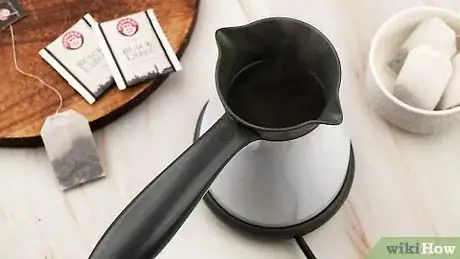
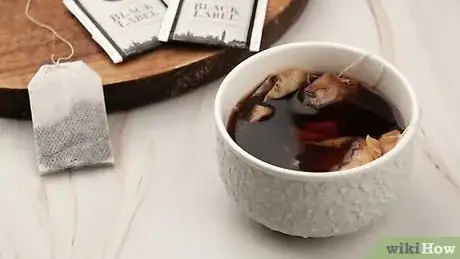

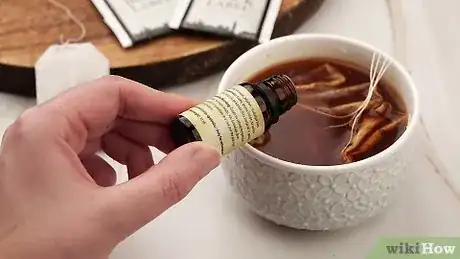
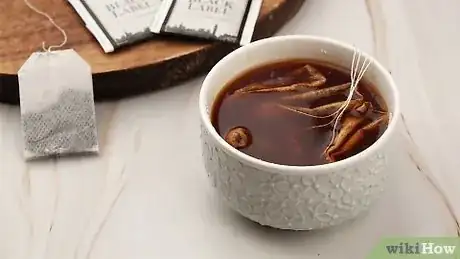
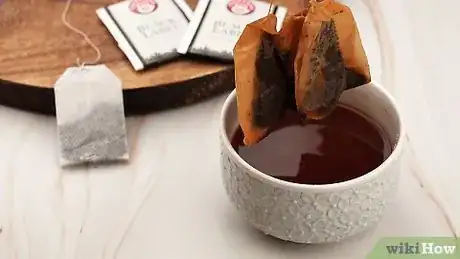
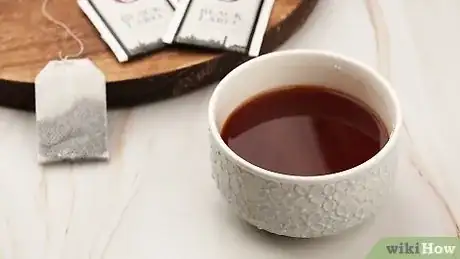
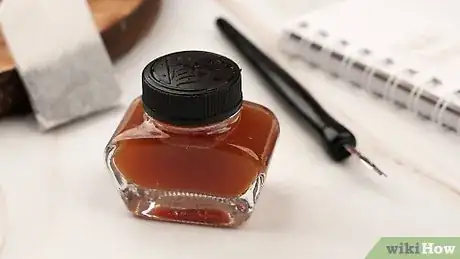
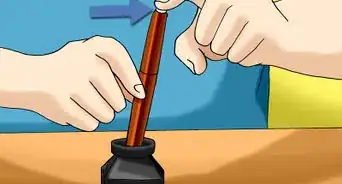
-Step-11.webp)



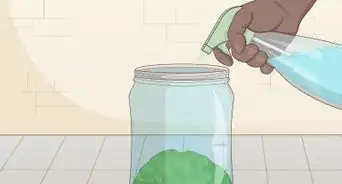









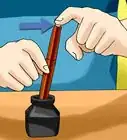
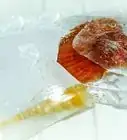
-Step-11.webp)



































